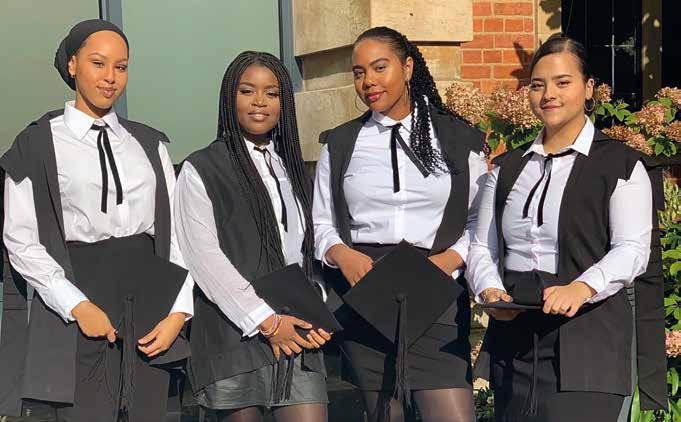
4 minute read
Nadia Awad: Action is Better than Words
In May 2020, Somerville students Nadia Awad, Danielle Welbeck, Ibtihaaj Mohamoud and Cara Moran created a fundraiser to help support Black Lives Matter protesters. After meeting their original fundraising goal in a matter of hours, they went on to raise £135,145. Here Nadia Awad considers why the fundraiser did so well and how Somerville and Oxford need to learn from the BLM movement.
‘W eird’ is the only word that can accurately describe the last few months. I’ve just done a whole Oxford term from my bedroom, complete with occasional *surprise* appearances from my sisters at early morning tutorials (why were they even awake?).
Advertisement
With the universe narrowed to the size of your own four walls thanks to the lockdown, social media has become more important than ever for all of us - so when George Floyd was murdered by the Minneapolis Police on 25th May, there was no escape from seeing the brutality and horror of what had happened for black students like myself.
Those images are difficult enough for anyone to see, and comment duly began to flood in as the world reacted. However, many of the responses around me seemed to be performative – words without actions or even the intention to take meaningful action. There were also those institutions or individuals that remained silent out of a fear of not being constructive, or perhaps simple complacency.
Posting on social media or changing your profile picture for a few days doesn’t achieve much in the scheme of things; activism requires action. This thought is what has spurred the protests around the world, and it’s also what prompted Danielle to suggest the idea of starting a fundraiser to Ibti, Cara and myself. We also had help from our friend Emma Schutze, another Somerville undergrad. As Danielle put it, ‘if these people online actually care, they will put their money where their mouths are’. With the Minnesota Freedom Fund recommending fundraisers support other charities, we looked around and found the National Lawyers Guild. An organisation with an 80-year history, they became known for representing arrested demonstrators during the Civil Rights era and are defending protestors on the right side of history again today. Money donated to the fundraiser would help to support arrested protesters and the work of the NLG in defending them.
Things are different this time around
Danielle wrote the Facebook post, and we launched the fundraiser with an initial goal of £2,000 in two weeks. We thought this was ambitious – until we raised the total in under two hours. At first it was our friends at Somerville who were donating, but with everyone glued to social media right now it started to take off. They shared it with their friends and their families, and soon it went around the world.
We couldn’t increase the fundraising goal fast enough to match the speed of contributions – every time we clicked refresh, the number was getting bigger and bigger. People donated £10,000 in the first 24 hours, and by the time the fundraiser ended we had helped to raise £135,145. It was absolutely staggering – we couldn’t believe it.
From left to right: Ibtihaaj, Danielle, Nadia and Cara
I feel like we underestimated how many people would share our desire to take meaningful action. Things are different this time around. The visceral, harrowing nature of that video of George Floyd’s killing and of other acts of police violence have finally spurred a lot of people to take a proactive approach to anti-racism.
For me, it feels like change is finally happening – but we’re not there yet. As a black student at Oxford from a state school background, I’ve found that the institution itself has still not woken up to the fact it needs to be making proactive attempts to improve. We need to end the devil’s advocate culture that can sometimes exist.
Another trap that faculties, colleges and the university often get stuck in is asking minorities what they want, rather than investing time and money to generate a programme for change proactively. After all, Oxford is a pipeline that feeds people into some of the most influential jobs in society, so change there can have a huge impact.
One thing that has been great at Oxford is the help and solidarity I get from my peers. The Oxford African and Caribbean Society are wonderfully supportive, as is our JCR President Talisha Ariarasa. But they shouldn’t have to be great – it shouldn’t be the responsibility of students from minorities to support each other and create institutional change alongside
everything else we’re trying to learn and achieve at Oxford. It wasn’t us who created or benefitted from these structures. It’s time for the University to be honest about its past and present and take the initiative in changing its future.
What would my message to Somervillians be? You had the privilege of a fantastic education at Oxford, and now you have the knowledge and the social and cultural capital you need to change the world for the better. Challenge your own biases and other people’s; examine your day to day interactions with black people and people of colour. Speak up in the face of injustice and use your influence to back up words with action. Engage with black art, music, and culture to help you empathise with this struggle.









